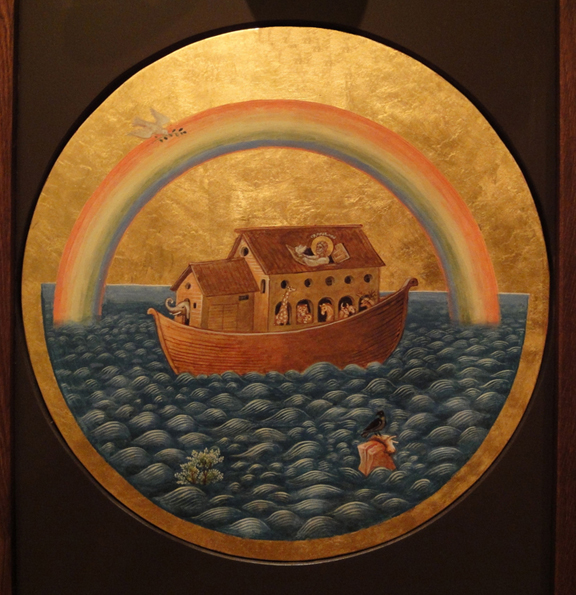 |
| Paradise – Jan Bruegel (1620) |
1 John 5:9-13 New Revised Standard Version
9 If we receive human testimony, the testimony of God is greater; for this is the testimony of God that he has testified to his Son. 10 Those who believe in the Son of God have the testimony in their hearts. Those who do not believe in God have made him a liar by not believing in the testimony that God has given concerning his Son. 11 And this is the testimony: God gave us eternal life, and this life is in his Son. 12 Whoever has the Son has life; whoever does not have the Son of God does not have life.
13 I write these things to you who believe in the name of the Son of God, so that you may know that you have eternal life.
*******
It’s the Seventh Sunday of Easter. That means we’re just a step away from Pentecost Sunday. That means the Ascension of Jesus is in play. If you’re not part of a tradition that gathers on Ascension Day itself, you may be celebrating the ascension on this Seventh Sunday. If so, you might find yourself looking to see what the Ascension reading Ephesians 1:15-23 has to say. However, if you’ve been hanging out with 1 John since the beginning of Eastertide, you might want to stay one more Sunday with John. This reading, which is brief continues the thought from last week’s selection. In the previous reading, we heard a message about being born of God and being children of God. To be born of God involves believing in Jesus, which has both content elements and trust elements. You have to believe Jesus has something to say about God if you’re going to trust your life to Jesus. In my reflection on last week’s reading, I took things beyond the lectionary cutoff at verse 6 to get us to verse 9. This week we pick up with verse 9 and continue with the story.
John wants us to know that if we think that human testimony is valuable, then the testimony of God is even greater. According to John, God testifies to his Son. Since there is no higher authority to which one can appeal, then we must receive as complete the message God has provided. If we heed this testimony, that is, if we allow it to penetrate our hearts, then we are born of God and therefore part of God’s family. What a family this is!
The Gospel reading for the Seventh Sunday in Eastertide takes us to John 17, where Jesus prays for his followers. In this prayer, Jesus acknowledges that God had given him this group of people. Now Jesus wants to give them back to God so God might protect them from the evil one (Jn 17:6-19). While we don’t see a lot of talk about resurrection in these passages, at least not explicitly, they do speak of eternal life. For Christians, eternal life is connected to the resurrection of Jesus. According to John, God has testified about Jesus by offering the gift of eternal life, which is to be found in the Son. That is, “whoever has the Son has life.” There is, of course, a flip side to this message. If you don’t have the Son, that is, you don’t believe/trust in the Son, you don’t have life. The choice is yours, and it’s a life-and-death decision.
This is a rather brief passage that on the surface doesn’t seem to have a lot of meat to it. There is a call to believe the testimony of God by taking it to heart. In this there is life. Could that involve this life we’re living now? Yes, of course. To trust in Jesus is to follow him. But is there more?
If someone was to choose this passage to preach, this one might allow the preacher to reflect on the question of eternal life. That’s the way the letter closes—with a word about believing in Jesus so that one might have eternal life. John doesn’t define what that means, so a preacher will have to fill in the gaps. But that’s okay because it opens the conversation which can be filled in with other words and passages that are a bit more definitive. Besides, anything we say about eternal life is tentative. Yet, tentative is better than nothing at all. Not only that, but eternal life is part of God’s testimony to Jesus.
Sometimes, in more liberal/progressive clergy circles, I hear a sense of disdain for the question of whether there is life after death. Talk about eternal life is said to be a distraction from the work that needs to be done here on earth. Besides, even if there is life after death, what can be said about it that is definitive? It’s not a testable assertion unless you embrace the stories about people coming back to life. But these testimonies are not conclusive, and they differ from person to person. There are passages like the vision of the New Heaven and New Earth in Revelation 21 and 22. In that final vision, the saints of God will eat of the Tree of Life, bringing us back to the Garden. Is this the vision that John has in mind? Or something else?
While we don’t have definitive answers and there is much to do here on earth to make life livable, the questions remain. Is this all there is? It’s a question that gets raised at funerals and death beds. When people gather at a funeral, they want to hear a word of assurance that their loved one lives on in some way. Although we can’t offer proof, we give the testimony to the resurrection. Yes, it may involve the use of our imagination to envision what might be on the other side. Of course, John speaks here of God’s testimony that is present in our hearts. Is this not sufficient for a follower of Jesus? Once again, John doesn’t define what he means by eternal life. That gives us room to consider the various possibilities.
So, I wish to conclude the reflection with this word from the late Orthodox theologian Alexander Schmemann’s book O Death, Where Is Thy Sting?
The Church is the entrance into the risen life of Christ; it is communion in life eternal, “joy and peace in the Holy Spirit.’’ And it is the expectation of the “day without evening” of the kingdom; not of any “other world,” but of the fulfilment of all things and all life in Christ. In him death itself has become an act of life, for he has filled it with himself, with his love and light. In him “all things are yours; whether . . . the world or life or death or the present or the future, all are yours; and you are Christ’s; and Christ is God’s” (1 Cor 3:21-23). And if I make this new life mine, mine this hunger and thirst for the kingdom, mine this expectation of Christ, mine the certitude that Christ is Life, then my very death will be an act of communion with Life. For neither life nor death can separate us from the love of Christ. I do not know when and how the fulfilment will come. I do not know when all things will be consummated in Christ. I know nothing about the “whens” and “hows.” But I know that in Christ this great Passage, the Pascha of the world has begun, that the light of the “world to come” comes to us in the joy and peace of the Holy Spirit, for Christ is risen and Life reigns. [Schmemann, Alexander. O Death, Where Is Thy Sting. St Vladimir’s Seminary Press. Kindle Edition.]
To this message of eternal life rooted in the resurrection, I give thanks.
***************
Image Attribution: Bruegel, Jan, 1568-1625. Paradise, from Art in the Christian Tradition, a project of the Vanderbilt Divinity Library, Nashville, TN. https://diglib.library.vanderbilt.edu/act-imagelink.pl?RC=54171 [retrieved May 8, 2021]. Original source: http://commons.wikimedia.org/wiki/File:Jan_Brueghel_the_Younger_Paradise.jpg.









